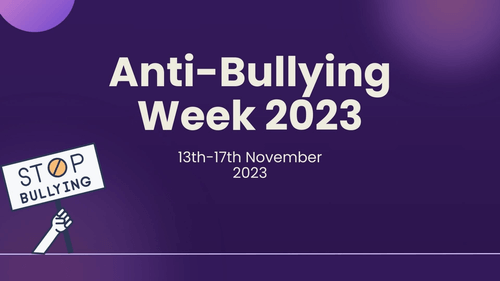Monday 13th November – Friday 17th November 2023 marks Anti-Bullying Week, which will be celebrated across schools in the UK and worldwide. This year’s theme is ‘Make A Noise About Bullying’, and the week will begin with Odd Socks Day, where everyone is encouraged to wear odd socks to celebrate what makes us all unique.
The Education Welfare and Safeguarding Team at One Education supports schools with all areas of safeguarding practice and attendance support. They encourage schools to do their very best to ensure that all pupils have access to education and the safe, nurturing, sociable environments that schools provide. It goes without saying that school absence is an issue which is being considered on a national scale at present, with the impact of mental health in young people and repercussions of the Coronavirus pandemic still being felt throughout schools. But, in this blog, I want to consider the impact of bullying on attendance, and to think more about what we can do to ensure that bullying is identified and responded to effectively in schools, so that this is not a barrier to accessing education in an already difficult climate.
Government research from the Omnibus survey in 2022 shows that there is a connection between school absence and incidents of bullying – 28% of pupils who were not present in school every day for 2 weeks were more lightly to report incidents of bullying, compared to 19% of pupils who attended every day. This percentage rose to 44% for pupils who had not attended school at all within those 2 weeks. In addition, the proportion of pupils that were absent due to mental health and anxiety was higher for those who had been a victim of bullying (32% compared to 16%). Research from the Anti-Bullying Alliance also suggests that there are specific cohorts of pupils who are at increased risk of bullying:
- Children with SEND
- LAC or previously LAC
- Young carers
- Children in receipt of school meals
- LGBTQ+ pupils
- Gypsy, Roma and Traveller children
- Children with mental health conditions
- Mixed race children
- Children who are immigrants or refugees
Many schools analyse attendance data for the above cohorts, with most schools reporting lower attendance for these pupils. It is possible to deduce that these children are at greater risk of being persistently absent from school due to their experiences of bullying.
So, what can schools do to understand further the impact of bullying on attendance?
It’s important to consider the data, and to ensure that reasons for unauthorised absence from school are looked into in greater detail. Attendance comments on the register should be clear, professional and consistent and if a parent or pupil has raised concerns about bullying, there should be a clear record of this. In addition, further discussions, follow-ups and support should be recorded on the school’s system for recording safeguarding concerns, so that this is considered in more detail and intervention is in place at an early stage. At present, there are a high volume of children absent from school due to poor mental health and/or emotional-based school avoidance. Schools must do all they can to engage pupils and parents in understanding more about how this presents, and whether bullying is part of the issue.
Consider running a questionnaire within your school to ask pupils about their experiences of bullying, and specifically whether this has ever affected their ability to come into school. You may be surprised at some of the feedback, and might gain further insight into the reasons for absence amongst pupils where attendance is a concern.
What do we need to do to minimise the impact?
Ensure that there are clear references to attendance within your school’s Anti-Bullying Policy, and similarly, references to bullying in your school Attendance Policy. This will help parents and pupils to understand the school’s stance on bullying and also the support that will be offered where this may be a reason for poor attendance.
Finally, school attendance, simply put, is about inclusion. If your school doesn’t respond quickly or robustly to allegations of bullying, or there is a culture of poor behaviour and a failure of holding pupils to account, those pupils who may have been victims of bullying in the past are less likely to attend school. Where pupils feel safe, listened to, advocated for, they are more likely to attend. Where young carers are welcomed and supported in school, where all cultures and religions are celebrated and where LGBTQ+ pupils and staff are seen and heard, your setting becomes a safe, inclusive environment where bullying is not tolerated or accepted, and pupils are more likely to attend.
Find out more about the Education Welfare and Safeguarding Team
References:
Parent, pupil and learner panel omnibus surveys for 2021 to 2022
Written evidence submitted by the Anti-Bullying Alliance (National
Children’s Bureau)
Please complete the form below and we will get in contact as soon as we can to help you with your query.
















